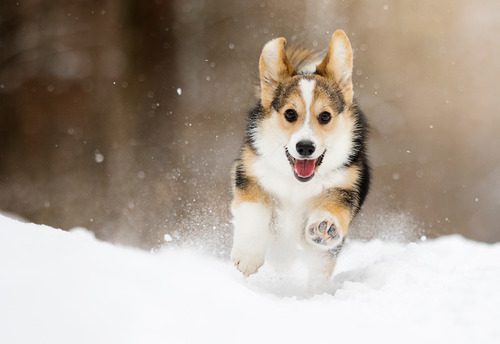Winter brings a magical transformation to the landscape, but with it comes concerns for our canine companions. As temperatures drop and snow begins to blanket the ground, you might wonder, “Can dog paws handle snow?” This blog explores the impact of snow on your dog’s paws, how to protect them, and when it’s time to seek professional advice. For further assistance, call Millis Animal Hospital at 508-376-5317.

The Impact of Snow on Dog Paws
When it snows, your dog’s paws are directly exposed to cold temperatures and harsh conditions. Unlike humans, dogs don’t wear shoes, making their paws vulnerable to frostbite, ice, and chemical agents like salt. Let’s dive into the primary concerns:
Cold Temperatures
Dogs’ paw pads are tough, but they aren’t immune to the cold. Prolonged exposure to snow can lead to frostbite, particularly on their toes and paw pads. Signs of frostbite include discoloration, swelling, and blisters.
Ice and Snow Compaction
Ice and snow can get compacted between your dog’s toes, causing discomfort and potential injury. This compaction can lead to cracked pads, cuts, and abrasions, making it painful for your dog to walk.
Chemical Agents
De-icing agents, like salt and chemicals, are often used to melt snow on roads and sidewalks. These substances can be toxic if ingested by licking and can cause irritation or burns to your dog’s paws.
Recognizing the Signs of Paw Problems
It’s crucial to recognize when your dog might be experiencing discomfort or injury from the snow. Here are some signs to watch for:
Limping or Reluctance to Walk
If your dog starts limping or seems hesitant to walk on snowy surfaces, it might be due to pain or discomfort in their paws. This behavior can indicate frostbite, cuts, or ice compaction.
Excessive Licking or Chewing
Dogs will often lick or chew their paws if they are experiencing discomfort. This behavior can lead to further irritation or injury, so it’s essential to monitor and address the underlying issue.
Visible Injuries
Regularly inspect your dog’s paws for any visible injuries such as cuts, cracks, or redness. Early detection can prevent minor issues from becoming severe problems.
How to Protect Your Dog’s Paws in Snow
While dog paws are naturally resilient, they still need protection during snowy conditions. Here are some effective measures to keep their paws safe:
- Paw Balm and Wax: Applying paw balm or wax before heading out can create a protective barrier against the cold and prevent ice and snow from sticking to your dog’s paws. These products can also help moisturize and heal any existing cracks or cuts.
- Booties: Dog booties are an excellent way to protect your dog’s paws from snow, ice, and chemicals. Ensure they fit properly and are made from durable, non-slip materials. Some dogs may take time to get used to booties, so introduce them gradually.
- Post-Walk Paw Care: After a walk in the snow, rinse your dog’s paws with warm water to remove any ice, snow, or chemicals. Dry their paws thoroughly and check for any signs of injury or irritation. Apply a moisturizing paw balm to keep their pads soft and healthy.
When to Seek Professional Advice
While taking preventive measures can protect your dog’s paws, there are times when professional help is necessary. Here are scenarios where you should contact Millis Animal Hospital:
Persistent Limping or Discomfort
If your dog continues to limp or show signs of discomfort despite your efforts, it may indicate a more severe issue that requires veterinary attention.
Severe Injuries
Cuts, cracks, or burns that don’t heal quickly or appear to worsen need to be evaluated by a veterinarian. Prompt treatment can prevent infection and further complications.
Suspected Frostbite
Frostbite can be a severe condition requiring immediate veterinary care. If you suspect your dog has frostbite, especially with symptoms like discoloration or blisters, seek professional help right away.
Keeping Your Dog Safe and Comfortable in Snow
Your dog’s safety and comfort during snowy conditions are paramount. By recognizing the signs of paw problems, taking preventive measures, and knowing when to seek professional help, you can ensure your dog enjoys the winter wonderland without suffering from paw-related issues. For any concerns or further advice, call Millis Animal Hospital at 508-376-5317.
Recent Posts
About Us
Millis Animal Hospital is a privately owned AAHA-accredited, Cat-Friendly Certified practice staffed with Fear Free Certified professionals. We know a thing or two about treating pets and their families the way they deserve, with excellent preventive care and surgical services tailored to your individual needs.
